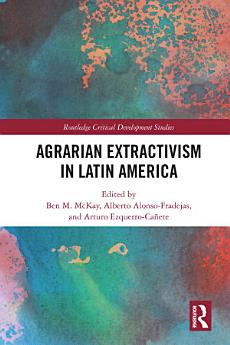Agrarian Extractivism in Latin America
এই ইবুকখনৰ বিষয়ে
The concept goes beyond the more apparent features of monocultures and raw material exports to examine the inherent logic and underlying workings of a model based on the appropriation of an ever-growing range of commodified and non-commodified human and non-human nature in an extractivist fashion. Such a process erodes the autonomy of resourcedependent working people, dispossesses the rural poor, exhausts and expropriates nature, and concentrates value in a few hands as a result of the unquenchable drive for profit by big business. In many instances, such extractivist dynamics are subsidized and/or directly supported by the state, while also dependent on the unpaid, productive, and reproductive labour of women, children, and elders, exacerbating unequal class, gender, and generational relations. Rather than a one-size-fits-all definition of agrarian extractivism, this collection points to the diversity of extractivist features of corporate-led, external-input-dependent plantation agriculture across distinct socio-ecological formations in Latin America.
This timely challenge to the destructive dominant models of agricultural development will interest scholars, activists, researchers, and students from across the fields of critical development studies, rural studies, environmental and sustainability studies, and Latin American studies, among others.
লিখকৰ বিষয়ে
Ben M. McKay is Assistant Professor of Development and Sustainability in the Department of Anthropology and Archaeology at the University of Calgary in Canada. His research focuses on the political economy and ecology of agrarian change in Latin America, agrarian extractivism, and food sovereignty alternatives. He is the author of The Political Economy of Agrarian Extractivism: Lessons from Bolivia (2020) and co-editor of The Edward Elgar Handbook of Critical Agrarian Studies (2021) and Rural Transformations and Agro-Food Systems (2018).
Alberto Alonso-Fradejas is Postdoctoral Researcher at the Human Geography and Planning Department, Faculty of Geosciences, Utrecht University. Alberto is also an Associate Researcher at the Transnational Institute (TNI) in Amsterdam, a Fellow of the Guatemalan Institute of Agrarian and Rural Studies (IDEAR), and Reviews Section Co-Editor for the Journal of Peasant Studies (JPS).
Arturo Ezquerro-Cañete holds a double PhD in International Development Studies from Saint Mary’s University and the Autonomous University of Zacatecas. His research focuses on the dynamics of agrarian transformations and new peasant movements in Paraguay. His work has been published in scholarly journals such as Journal of Agrarian Change, Latin American Perspectives, and Estudios Críticos del Desarrollo.




